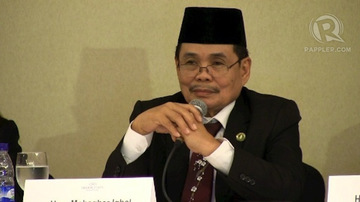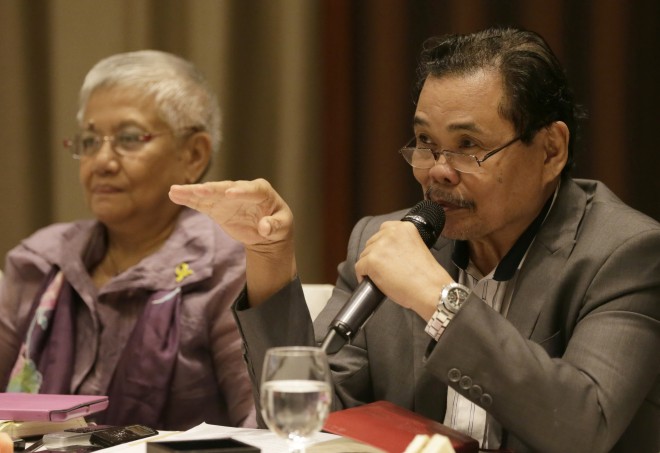
Moro Islamic Liberation Front (MILF) Chief Negotiator Mohagher Iqbal said yesterday, September 18, that the Moro Front will not stop its members who will be charged for the Mamasapano incident from defending themselves if they face prosecution.
"We do not ask them not to do something that would help them get out of that whole problem... Yung organisasyon of the MILF will not prevent them because that's an internal legal process of the government. But on the individual level we will not prevent individual members of the MILF who are part of the list to access something to defend themselves", Iqbal said.
“It can include legal, maybe access to lawyers. On the individual decision-making, they can access to lawyers on their own personal capacity. We will not stop them," he added.
Iqbal said they will not encourage their members, but they will not stop them as well.
He said the prosecution of the Mamasapano incident does not cover the MILF as an organization.
"The filing of cases against 20 or more than 20 members of the MILF is an internal legal process of government which the MILF is not a party to. We will not participate, but on the other hand we will not stop individual members of the MILF if they want to access through the service of the lawyer to defend themselves," he said.
Asked if the MILF will shield those who may be charged, Iqbal said: "What the MILF can do is invoke the provisions of existing mechanisms of the peace process. That is the binding agreement as far as the government and MILF, especially the provisions of the ceasefire. If there is a violation on either side, if it's committed by government forces then the government will take charge of that."
Asked if they will surrender MILF members, Iqbal said: "I will not go to that extent."
Commenting on the truth about the incident, Iqbal said they would rather leave to the public to decide on the Mamasapano incident although they stand by the findings of the MILF's own investigation.
"There are 5 to 6 versions (on the Mamasapano incident from) the PNP (Philippine National Police), DOJ (Department of Justice), NBI (National Bureau of Investigation), IMT (International Monitoring Team), MILF. So let the people decide which of these versions is the truth or leading to the truth," he said.
"On the findings of the MILF investigating team, that's official. We hold that as the official version. But we have buried this issue already. We do not want to revive it because both on the side of the government and MILF are already resting in their graves. If we try to revive this issue, not only people resting in their graves but the families na naghihilom na ang sugat [ang maapektuhan]," he added.
Presidential Adviser on the Peace Process Ging Deles said Justice Secretary Leila de Lima will explain what needs to be done.
Deles said the MILF who may be charged can opt to waive their right to submit a counter-affidavit.
Deles said there may be fewer than 26 MILF who may be charged. "Tinatanggap naman na yung baka hindi lahat ito tunay na pangalan, may palayaw daw. Yun kailangan himayin kasi subpoena will have to be delivered to that person."
She also explained that the MILF as a group will not be covered by the process because the offense was done by individuals.
http://www.luwaran.com/index.php/new/item/574-milf-won-t-stop-members-from-defending-themselves-if-they-face-prosecution-on-mamasapano-iqbal
“It can include legal, maybe access to lawyers. On the individual decision-making, they can access to lawyers on their own personal capacity. We will not stop them," he added.
Iqbal said they will not encourage their members, but they will not stop them as well.
He said the prosecution of the Mamasapano incident does not cover the MILF as an organization.
"The filing of cases against 20 or more than 20 members of the MILF is an internal legal process of government which the MILF is not a party to. We will not participate, but on the other hand we will not stop individual members of the MILF if they want to access through the service of the lawyer to defend themselves," he said.
Asked if the MILF will shield those who may be charged, Iqbal said: "What the MILF can do is invoke the provisions of existing mechanisms of the peace process. That is the binding agreement as far as the government and MILF, especially the provisions of the ceasefire. If there is a violation on either side, if it's committed by government forces then the government will take charge of that."
Asked if they will surrender MILF members, Iqbal said: "I will not go to that extent."
Commenting on the truth about the incident, Iqbal said they would rather leave to the public to decide on the Mamasapano incident although they stand by the findings of the MILF's own investigation.
"There are 5 to 6 versions (on the Mamasapano incident from) the PNP (Philippine National Police), DOJ (Department of Justice), NBI (National Bureau of Investigation), IMT (International Monitoring Team), MILF. So let the people decide which of these versions is the truth or leading to the truth," he said.
"On the findings of the MILF investigating team, that's official. We hold that as the official version. But we have buried this issue already. We do not want to revive it because both on the side of the government and MILF are already resting in their graves. If we try to revive this issue, not only people resting in their graves but the families na naghihilom na ang sugat [ang maapektuhan]," he added.
Presidential Adviser on the Peace Process Ging Deles said Justice Secretary Leila de Lima will explain what needs to be done.
Deles said the MILF who may be charged can opt to waive their right to submit a counter-affidavit.
Deles said there may be fewer than 26 MILF who may be charged. "Tinatanggap naman na yung baka hindi lahat ito tunay na pangalan, may palayaw daw. Yun kailangan himayin kasi subpoena will have to be delivered to that person."
She also explained that the MILF as a group will not be covered by the process because the offense was done by individuals.
http://www.luwaran.com/index.php/new/item/574-milf-won-t-stop-members-from-defending-themselves-if-they-face-prosecution-on-mamasapano-iqbal





